Photo Gallery
The University of the Free State conferred about 1 900 diplomas, ACE/ACT certificates, and master’s and doctoral degrees across all seven faculties at this year’s June graduation ceremonies.
South Africa is in awe of UFS graduates who are driven by their passion for academy despite adverse circumstances, with a single goal in mind – achieving academic excellence and advancing their lives to a state of elevation.
From delivering five PhDs in the Department of Inorganic Chemistry, to securing 48 master’s degrees and 1 PhD in Sustainable Agriculture, to conferring a Master of Divinity degree cum laude to 75-year-old Dr Hanneke Meyer, the UFS June 2018 graduation ceremonies have proven that anything is possible once you set your mind to it.
UFS Chancellor, Dr Khotso Mokhele, urged that, “We need to do everything in our power to re-elevate the teaching profession to where it should be.”
Prem Govender, guest speaker at the School of Financial Planning Law’s graduation on Wednesday 27 June 2018, encouraged graduates to exercise integrity in their future professional lives, to recognise those who enabled them to succeed, and to strive to be beacons of hope in the lives of others. “Second to the medical profession, financial planning is essential, as it ensures the financial wellbeing of society,” she said.
Advanced Certificates in Education and Teaching were awarded to our South Campus for Open Distance Learning. Greg van Schalkwyk, Principal of the Cape Academy of Mathematics, Science and Technology, reviewed technological changes across the past three centuries, highlighting that teachers are preparing students for the 21st century, the Information Age, and the Fourth Industrial Revolution. He urged teachers to follow their students' example, saying: "Never stop studying. My students keep telling me – 'Sir, if you don't know something, Google it!’”
Speaking at the afternoon graduation session for master’s and PhD graduates in the Faculty of Natural and Agricultural Sciences on 28 June 2018, Max du Preez, South African author, columnist and documentary filmmaker, said, “Intelligentsia search for the truth, because the truth matters.”
On the final day of the graduation ceremonies, the Rector and Vice-Chancellor, Prof Francis Peterson, addressed the audience by saying, “The values we strive to infuse into our knowledge enterprise are those of critical enquiry and receptiveness to alternative ideas: to question, ask, and debate constructively; but we also impart the value of service.” He concluded by sharing that, “To be of service to your community, to the country, the continent, and even to the world is the role graduates are expected to play.”
Inspiring stories:
Security officer overcoming obstacles to obtain master’s
Hanneke Meyer obtains master’s with distinction at 75
Wednesday 27 June 2018
09:00
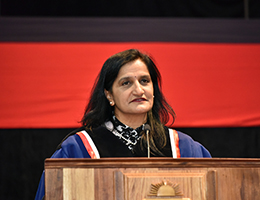
“Second to the medical profession, financial planning is essential as it ensures the financial well-being of society.”
Prem Govender
WATCH: UFS June Graduation Ceremony 27 June 2018 ( morning session)14:30
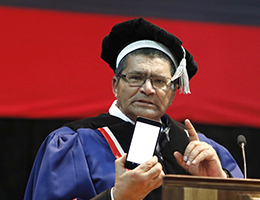
"Never stop studying. My students keep telling me; 'Sir, if you don't know something, Google it!'"
- Greg van Schalkwyk, Principal of the Cape Academy of Mathematics, Science and Technology
Watch: UFS June Graduation Ceremony 27 June 2018 ( afternoon session)
Thursday 28 June 2018
09:00
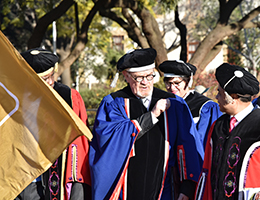
"Intelligentsia search for the truth, because the truth matters.”
- Max du Preez, South African author, columnist and documentary filmmaker
WATCH: UFS June Graduation Ceremony 28 June 2018 ( morning Session)
14:30
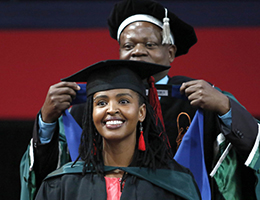
“We need to do everything in our power to re-elevate the teaching profession to where it should be.”
– Dr Khotso Mokhele
WATCH: UFS June Graduation Ceremony 28 June 2018 ( afternoon session)Friday 29 June 2018
14:30
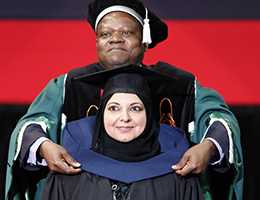
“To be of service to your community, to the country, the continent, and the globe is the role that graduates will play.”
-Prof Francis Peterson
WATCH: UFS June Graduation Ceremony 29 June 2018 ( afternoon session)